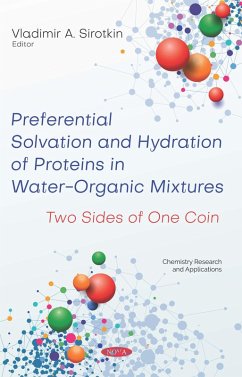This book describes the basic principles of a novel methodology to investigate the preferential hydration and solvation of proteins in ternary protein-water-organic solvent systems. Protein-water interactions are well-known to play a critical role in determining the function, structure, and stability of protein macromolecules. Elucidation of the processes occurring upon protein hydration in the presence of third component (organic solvents, salts, urea) is essential in a wide range of biophysical, biomedical, and biotechnological applications. In particular, there are many advantages in employing water-poor organic solvents, including the suppression of undesirable side reactions caused by water, the biocatalysis of reversed hydrolytic reactions (transesterification, peptide synthesis), or increased thermostability. Distinct intermediate protein states induced by organic solvents may be responsible for numerous neurodegenerative diseases (Alzheimer's disease, Parkinson's disease, and Huntington's disease). However, the manner in which organic solvents increase/decrease the thermal stability, induce/reduce the extent of denaturation, and stabilize/destabilize the partially folded conformations of proteins (amyloid fibrils and molten globules) is an intricate function of water content in organic liquids. Preferential hydration/solvation is an effective method for revealing the mechanism of the protein stabilization or denaturation. When a protein interacts with a binary water-organic solvent mixture, the three components do not equally mix. Water or organic solvent molecules exist preferentially in the protein's solvation shell. This difference between the solvation shell and bulk solvent in the solvent components has been termed preferential solvation. Preferential solvation is a thermodynamic quantity that describes the protein surface occupancy by the water and cosolvent molecules. This is associated with the actual numbers of water/cosolvent molecules that are in contact with the protein's surface. It was also found that the protein destabilization is directly associated with the preferential binding of the denaturant molecules to specific protein groups. The aim of our study is to monitor the preferential solvation and preferential hydration of the protein macromolecules at low, intermediate, and high water content in organic solvents at 25 oC. Our approach is based on the simultaneous measurements of the absolute values of the water and organic solvent sorption. The preferential solvation/hydration parameters were calculated using the water and organic solvent sorption values. The preferential solvation/hydration parameters were compared with the corresponding changes in the protein structure that transpire regarding the interaction of the protein with organic solvent and water molecules. The effect of organic solvent on the protein structure was investigated by FTIR (Fourier Transform Infrared) spectroscopy.
Dieser Download kann aus rechtlichen Gründen nur mit Rechnungsadresse in A, B, BG, CY, CZ, D, DK, EW, E, FIN, F, GR, HR, H, IRL, I, LT, L, LR, M, NL, PL, P, R, S, SLO, SK ausgeliefert werden.









